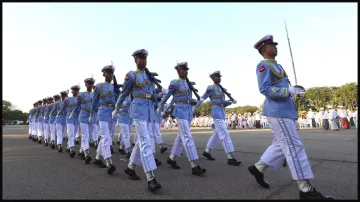Myanmar: China brokers temporary ceasefire deal between military and ethnic guerilla groups
As per Myanmar's military council, both sides agreed on an immediate ceasefire, the disengaging of military personnel and settlement of disputes through dialogue. China had been concerned about the rising violence and the safety of Chinese citizens in northern Myanmar.

Beijing: Myanmar's military has reached an agreement with an alliance of ethnic minority guerilla groups on an immediate ceasefire it had been battling in the country's northeast region, according to the Chinese foreign ministry on Friday. The temporary agreement was brokered at talks mediated by China on Wednesday and Thursday in Kunming, a Chinese provincial capital about 400 kilometers (250 miles) from the border with Myanmar.
This came days after an alleged military airstrike in the northwestern part of the country killed at least 17 civilians and injured more than 20 others, including nine children, according to local residents and a human rights group. However, the military denied responsibility for the aerial attack on Sunday, claiming that it was false news spread by media sympathetic to the anti-military resistance.
Chinese foreign ministry spokesperson Mao Ning informed about the new ceasefire deal between the military and the Three Brotherhood Alliance and said, "China hopes the relevant parties in Myanmar can conscientiously implement the agreement, exercise maximum restraint toward each other and solve the issues through dialogue and consultations."
Additionally, Zaw Min Tun, the spokesperson of Myanmar's ruling military council told journalists that the two sides had met in Kunming and after talks, agreed on a temporary cease-fire agreement. "We will continue discussions We will continue to work for the strengthening of the cease-fire," he added.
A previous cease-fire pact reached in mid-December was not honoured by either side. The Three Brotherhood Alliance - which comprises the Myanmar National Democratic Alliance Army, the Ta'ang National Liberation Army and the Arakan Army - launched a major offensive on October 27 last year, seizing towns in the country's northeast, along with major border crossings for trade with China. The resistance forces last week forced the army to give up the city of Laukkaing in northern Shan state near the Chinese border.
Amid the coordinated offensive, the Arakan Army also attacked outposts in its home state of Rakhine in the west, intensifying the conflict. The military, already grappling with a nationwide uprising led by the People's Defence Forces—a pro-democracy armed group formed after the military coup in February 2021—found itself facing another formidable front.
What does the ceasefire entail?
Chinese spokesperson Mao said the military and the Three Brotherhood Alliance have agreed to an immediate ceasefire, the disengaging of military personnel and the settlement of their disputes through negotiations. "The two sides promised not to undermine the safety of Chinese people living in the border area and Chinese projects and personnel in Myanmar," she said.
According to several reports, the military agreed to stop aerial bombing and artillery shelling in the northern Shan state, which shares a border with China, and the Three Brotherhood Alliance agreed to halt its offensive and not seek to capture more towns and army encampments. However, the ceasefire would not apply to other regions of Myanmar.
Much of the fighting is along Myanmar's border with China, blocking cross-border trade and threatening further political destabilisation of Myanmar, a strategic ally of China that is already tangled in the civil war in many parts of the country. China is concerned about the rising violence and the safety of Chinese citizens in northern Myanmar.
It has also cracked down on cyber scam operations that have trafficked Chinese workers into Myanmar and forced them to work. The anti-military confrontations by the ethnic guerilla groups have already claimed control over at least five major border crossing points controlling crucial trade with China.
Zaw Min Tun said Myanmar and China will continue to negotiate to reopen the border trading gates, which were closed after combat began and most or all of which are now in the hands of the Three Brotherhood Alliance.
Civil war in Myanmar
Myanmar is wracked by fighting between the military and rebel militias since the ouster of Aung San Suu Kyi's government in 2021. The military government in the past two years has stepped up airstrikes against the armed pro-democracy Peoples Defense Forces, and ethnic minority guerrilla groups that have been fighting for greater autonomy for decades. The two groups sometimes carry out joint operations against the army.
On Sunday, at least five people, including three teachers, were killed in an airstrike on Namhsan township, which was captured last month by the Ta'ang National Liberation Army, members of the Three Brotherhood Alliance.
Last year, thousands of people from Myanmar crossed into India after some ethnic minority insurgent groups attacked security posts in Myanmar, leading to a fresh fight erupting on two new fronts. The new combat was seen as another blow for the junta which is increasingly stretched amid mounting armed opposition, fuelled by anger over the coup and crackdown.
At least 151 Myanmar soldiers, who had crossed the Indian border and entered Mizoram's Lawngtlai district on December 29, were airlifted by the Myanmar Air Force from Aizawl, the capital of Mizoram. The soldiers had fled their camps near the international border after facing an onslaught from fighters associated with the Arakan Army.
(with inputs from AP)
ALSO READ | Situation near Indo-Myanmar border concerning, says Army chief General Manoj Pande